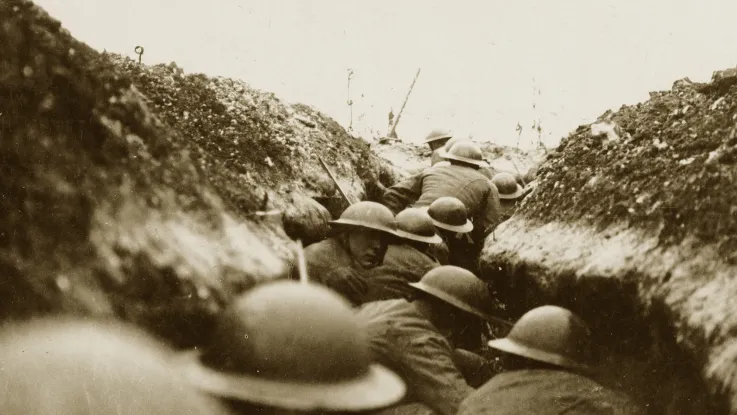Hampshire soldier’s story of leadership and bravery during the German Spring Offensive
One hundred years ago in March 1918 Acting Captain Alfred Toye, a second lieutenant with 2nd Battalion The Duke of Cambridge’s Own (Middlesex Regiment), found himself in the eye of the storm when the German Spring Offensive began. This attack saw mobile warfare return to the Western Front after years of stalemate. Initially, it looked like the Germans might succeed, but brave resistance from soldiers like Toye - who won the Victoria Cross for his gallantry - gradually blunted their assault.
On 21 March 1918, the Germans launched Operation Michael. The intense ‘hurricane’ bombardments from the Germans undermined any chance of concerted British resistance by targeting artillery and machine-gun positions, headquarters, telephone exchanges, railways and communication centres. Within two days the Germans had advanced up to 12 miles in some sectors.
Panic spread along sections of the Allied front and although many units bravely resisted, it appeared the Germans might break through, reach the vital railway junctions at Amiens, split the Allies and win a stunning victory.
In the First Battle of Bapaume (24-25 March), the 2nd Battalion held positions on the west bank of the Somme. The Germans attacked this area and soon took the Somme crossings. Captain Toye and part of his company found themselves surrounded, but they managed to fight their way out of the village. Toye rallied the soldiers and launched a counter-attack.
Late on 25 March they withdrew to the trenches south of Deniecourt but continued German attacks saw the retirement continue to Lihons, where they took up makeshift positions. The 2nd Battalion helped repel another attack at Lihons in the Battle of Rosieres (26-27 March). At one stage the enemy got within 300 yards of the Middlesex’s positions, but they held firm.
While under attack from German aircraft, the 2nd Battalion was compelled to retreat back to Caix where a new line was taken up. The Germans soon infiltrated the village. Toye, with his battalion headquarters, led them against the enemy in the streets long enough to allow another withdrawal.
On 31 March the remnants of the battalion, now commanded by Toye, were sent to re-inforce the 2nd Devonshires. This they did, in bitter hand-to-hand fighting, for the next two days. On 2 April they handed over their position to new French troops and the exhausted survivors of 2nd Battalion were withdrawn.
For his leadership and bravery during several days of intense fighting, Toye was awarded the Victoria Cross. His citation in the London Gazette on 7 May 1918 stated: ‘His valor and skilful leading throughout this prolonged period of intense operations was most conspicuous.’
Although the Germans advanced as much as 64km (40 miles), by 5 April their advance had lost momentum and they were held east of Amiens. German morale began to crumble. They were too exhausted to sustain the offensive and lacked the transport to convert local tactical triumphs into strategic victory.
On 18 July, the French launched a counter-attack on the Marne, forcing the Germans back. The initiative passed back to the Allies, setting the stage for the Allied counter-offensives of the summer.
Notes to editors
For more information please contact Kelly Scandone on marketing@nam.ac.uk or 020 7881 2433
Acting Captain Alfred Toye
Alfred Maurice Toye (1897-1955) was born at Stanhope Lines on Aldershot military base to Elizabeth Charlotte Toye (née Dodds) and James Robert Toye, who worked for the Army as a civilian clerk.
In 1912, Alfred joined the Royal Engineers’ Boys Battalion as a bugler. After being stationed at the Curragh in Ireland, he was sent to the Cadet School at Blendecques near St. Omer in the spring of 1916.
Toye was commissioned the following year as a second lieutenant with 2nd Battalion The Duke of Cambridge’s Own (Middlesex Regiment). For his gallantry on 31 July 1917 at the Third Battle of Ypres (1917) he was awarded the Military Cross. By Spring the following year he had been promoted to acting captain.
For his actions during the German Spring Offensive (1918), Toye was decorated with the VC by King George V on the Queen’s Parade at Aldershot on 8 June 1918.
After the war, Toye briefly served in North Russia and with the Middlesex Regiment as part of the Army of the Rhine in Germany. From 1925 to 1932 he was chief instructor at the Royal Egyptian Military College. He later served as Commandant of the War Office Schools of Chemical Warfare (1940-42), before serving with 6th Airborne Division and then with General Headquarters Middle East. He retired with the rank of brigadier and later settled at Tiverton in Devon.
Alfred Toye died on 6 September 1955 at The Madame Curie Memorial Foundation, Tidcombe Hall, Tiverton.
National Army Museum
The National Army Museum is the leading authority on the history of the British Army. Founded in 1960 by Royal Charter and established for the purpose of collecting, preserving and exhibiting objects and records relating to the Land Forces of the British Crown it is a museum that moves, inspires, challenges, educates and entertains.
The Museum seeks to tell the story of the British Army, the personal experiences of the soldiers who have served in it and to connect the British public and its army demonstrating how the role of the army and its actions are still relevant today.
Heritage Lottery Fund
Thanks to National Lottery players, we invest money to help people across the UK explore, enjoy and protect the heritage they care about - from the archaeology under our feet to the historic parks and buildings we love, from precious memories and collections to rare wildlife.
For more information, please contact Katie Owen, HLF press office on Tel: (020) 7591 6036 out of hours mobile: 07973 613820.



